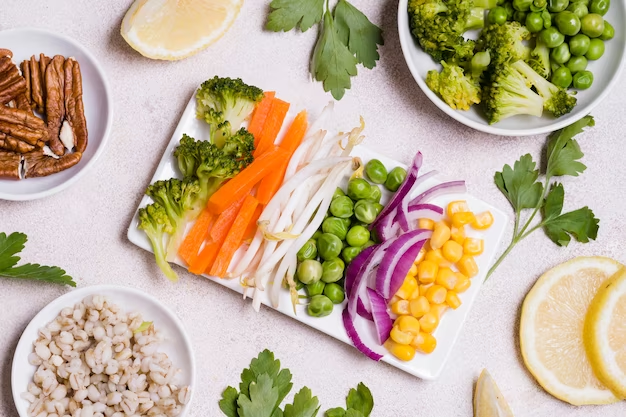Maximizing Your Nutrition with Low FODMAP Vegetable Choices
- Written by Business Daily Media
Step into the fascinating realm of low FODMAP vegetables, where the intricacy of flavors meets the burst of nutritional benefits. These vegetables, low in carbohydrates yet abundant in fiber, present an extraordinary opportunity to enhance digestive health, particularly for individuals grappling with irritable bowel syndrome (IBS) or similar concerns. Low FODMAP vegetables not only alleviate discomfort associated with IBS but also facilitate the maintenance of a well-balanced diet, ensuring overall well-being. Join us as we explore the manifold advantages of incorporating low FODMAP vegetables into your meals and discover expert tips for a seamless integration.
Unveiling the Low FODMAP Diet
Within the realm of nutrition trends, the low FODMAP diet has emerged as a powerful tool for addressing digestive ailments, captivating the attention of individuals seeking relief. Designed specifically for those with conditions such as IBS, this dietary approach revolves around the reduction or elimination of fermentable oligosaccharides, disaccharides, monosaccharides, and polyols (FODMAPs), a specific group of carbohydrates. The objective is to alleviate symptoms associated with IBS and various digestive complaints.
FODMAPs exist in an array of foods, including fruits, vegetables, grains, and dairy products. Their complex structures and sizes pose challenges for proper digestion, leading to fermentation in the large intestine. This fermentation process, carried out by bacteria, generates gas, which can result in abdominal pain and other gastrointestinal symptoms linked to IBS. The low FODMAP vegetables diet effectively mitigates these symptoms by restricting the consumption of high-FODMAP foods.
Embarking on a Journey Through Low FODMAP Vegetables
Are you seeking respite from digestive discomfort? Look no further than the captivating world of the low FODMAP diet. Focusing on low-FODMAP vegetables represents an optimal strategy for minimizing symptoms associated with IBS. Join us as we uncover a selection of the most enticing low-FODMAP vegetables, empowering you to seamlessly incorporate them into your meal plan today!
- Carrots: These versatile gems, low in FODMAPs, shine in raw or cooked form, complementing salads and side dishes alike.
- Celery: With its mild flavor and satisfying crunch, celery serves as a delightful raw snack or a delightful addition to soups, stews, and casseroles.
- Green Beans: Bursting with freshness, green beans offer a splendid option for steaming, sautéing, or incorporating into stir-fries.
- Bell Peppers: Vibrant and packed with nutrients, bell peppers can be savored raw in salads, roasted for added depth of flavor, or included in various cooked dishes.
- Zucchini: This versatile vegetable lends itself beautifully to spiralized dishes, grilling, roasting, or adding a touch of texture to soups and stews.
Benefits Galore: Embracing Low FODMAP Vegetables
Indulging in a wholesome, well-balanced diet takes on new meaning when grappling with digestive issues like IBS. Low FODMAP vegetables present an array of remarkable benefits that contribute to enhanced overall well-being:
- Enhanced Digestive Comfort: Low FODMAP vegetables, being easier to digest compared to their high-FODMAP counterparts, alleviate symptoms such as abdominal pain, bloating, and gas associated with IBS. Relish the peace of mind that accompanies a more comfortable digestive experience.
- Reduced Risk of Nutrient Deficiencies: Low FODMAP vegetables are teeming with essential vitamins, minerals, and fiber, which promote optimal health. Furthermore, their fiber content supports regularity and optimal digestive function, reducing the likelihood of constipation and other related concerns.
- Culinary Versatility: Low FODMAP vegetables, renowned for their captivating flavors and textures, lend themselves seamlessly to a myriad of culinary creations. Embrace the joy of exploring new recipes and savoring delicious meals that nurture both body and soul.
Top Tips for Preparing and Cooking Low FODMAP Vegetables
Unleash the full potential of low FODMAP vegetables through expert preparation and cooking techniques. Consider the following tips to maximize the culinary delights awaiting you:
- Scrutinize Labels with Care: When shopping for low FODMAP vegetables, scrutinize food labels diligently to identify potential high-FODMAP ingredients that may trigger symptoms. Be mindful of hidden sources and gain a comprehensive understanding of the contents before consumption.
- Thoroughly Rinse: Prior to cooking, ensure you thoroughly rinse low FODMAP vegetables with cold water. This simple step eliminates any residual bacteria or debris that might otherwise compromise your digestive well-being.
- Employ Appropriate Cooking Methods: Each type of vegetable possesses unique characteristics that influence the ideal cooking method. Remain attentive to cooking times and heat levels to ensure that your low FODMAP vegetables retain their friendly nature and remain safe for consumption by individuals with IBS or other digestive disorders.
In conclusion, the world of low FODMAP vegetables unveils a tantalizing opportunity to elevate your digestive health. Embrace the diverse flavors and nutritional benefits of these captivating vegetables as you embark on a journey toward enhanced well-being. With the power to alleviate symptoms associated with IBS and offer culinary versatility, low FODMAP vegetables are an indispensable addition to your kitchen repertoire. Delight in the wonders of these remarkable vegetables as they unlock a world of vibrant flavors and improved digestive harmony.










